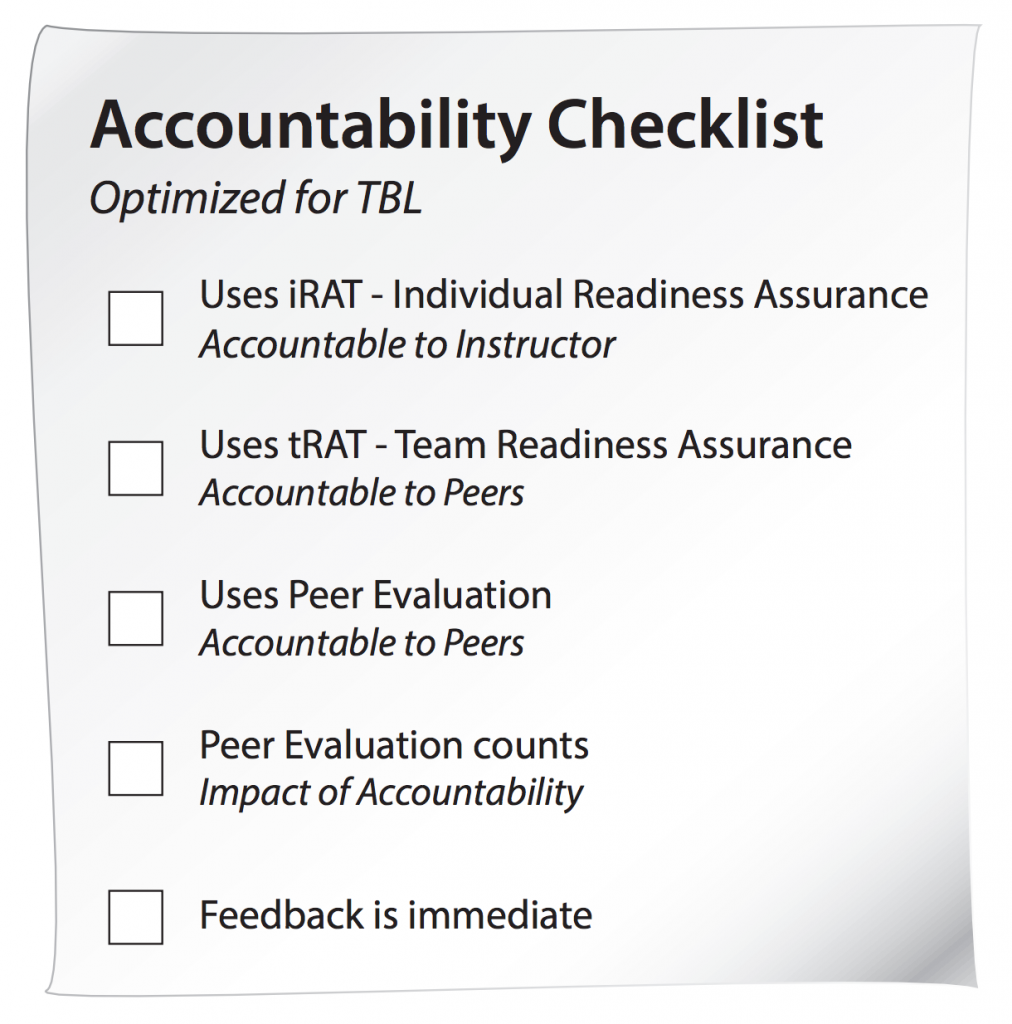Making Student Accountable
There are three things we should do to encourage productive student behaviours in the TBL classroom.
- Students must be encouraged to individually prepare.
- Students must be encouraged to contribute to their team.
- Students must be made aware that they will be accountable for their contributions to their team.
In order to accomplish these goals, we must incorporate three important corresponding measures into the overall course design to ensure that we encourage the behaviours we want. These are:
- Individual performance
- Team performance
- Contribution to the team
An important measure of an individual’s performance comes from the individual Readiness Assurance Test scores. These scores give instructors a measure of individual accountability for the quality and completeness of each student’s preparation. This component must be a substantial enough portion of the final grade so that a student feels compelled to prepare, but not so large that the Individual Readiness Assurance Test (iRAT) turns into high-stakes testing. There are often other measures of individual performance that are not related to TBL, including individual assignments, midterms, and final examinations. Students are sometimes shocked at first at the low individual scores on the iRATs. Typical averages are 65-70%; that’s perfectly normal. Students may need to be reassured that the RATs are working as designed, that they constitute only a small portion of their final grade, and that the higher team grade on the tRATs (typically 85-95%) will balance out the lower iRAT score.
The team performance measures come from all team activities that are graded. These include the team Readiness Assurance Test scores and, in some courses, the Application Activities.
The measure of a member’s contribution to their team typically comes from a peer evaluation process. Peer evaluations hold students accountable for their level of participation. Peer evaluations also reassure students that loafers won’t benefit from the typically higher team grade; this is a happy side effect of the process.
Something cool Larry recently noticed
There is a subtle, but extraordinary feedback and accountability process as part of the whole class report and discussion. If your team didn’t listen to an important minority opinion or a majority of team members were bullied into a choice, these poor choices often come to light during the whole class reporting discussion. The team members will understand that they committed an error in listening. This self-correcting feedback can automatically improve the team dynamics in subsequent activities.
Typical Grading Schemes
There is a wide range of grading schemes found in different Team-Based Learning courses. Course context, institutional culture, instructor goals, and course goals all need to be considered when you construct the grading scheme that is appropriate for your course. In some institutional environments, policy or local norms may not tolerate having a grade component like peer evaluation where students evaluate other students. For example, in some very competitive environments such as pre-med, it can be very difficult to sell a grading scheme that incorporates any summative peer evaluation process where one student assesses another student in a way that affects their final course grade. In these environments, the formative styles of peer evaluation are more commonly implemented, since they don’t affect student’s grades directly.
The TBL grade component in a prototypical TBL course with ungraded Application Activities (i.e. only iRAT and tRAT grades) can be as low as 25%. In these courses, the other 75% of grades might come from traditional components like individual essays, individual reports, midterms, and finals. There is considerable range on how TBL course grades are divided between individual and team work in different courses and contexts. In some courses, the grades are 100% based on TBL; these courses most often have graded Application Activities.
Excerpted from a 17 page chapter on The Importance of Accountability in Getting Started with Team-Based Learning by Jim Sibley and Pete Ostafichuk published by Stylus, Sterling, VA
Buy the book from Stylus Publishing Buy the book from Amazon

